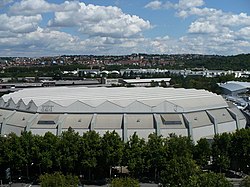| Basketball-Europameisterschaft 1985 | |
|---|---|
| Tournament details | |
| Host country | West Germany |
| Dates | 5–16 June |
| Teams | 12 |
| Venue(s) | 3 (in 3 host cities) |
| Final positions | |
| Champions | |
| Runners-up | |
| Third place | |
| Fourth place | |
| Tournament statistics | |
| Games played | 46 |
| MVP | |
| Top scorer | (28.1 points per game) |
The 1985 FIBA European Championship, commonly called FIBA EuroBasket 1985, was the 24th FIBA EuroBasket regional basketball championship, held by FIBA Europe. It took place from 5 to 16 June 1985 in West Germany. The Soviet Union defeated Czechoslovakia in the final to win their fourteenth and final title.


